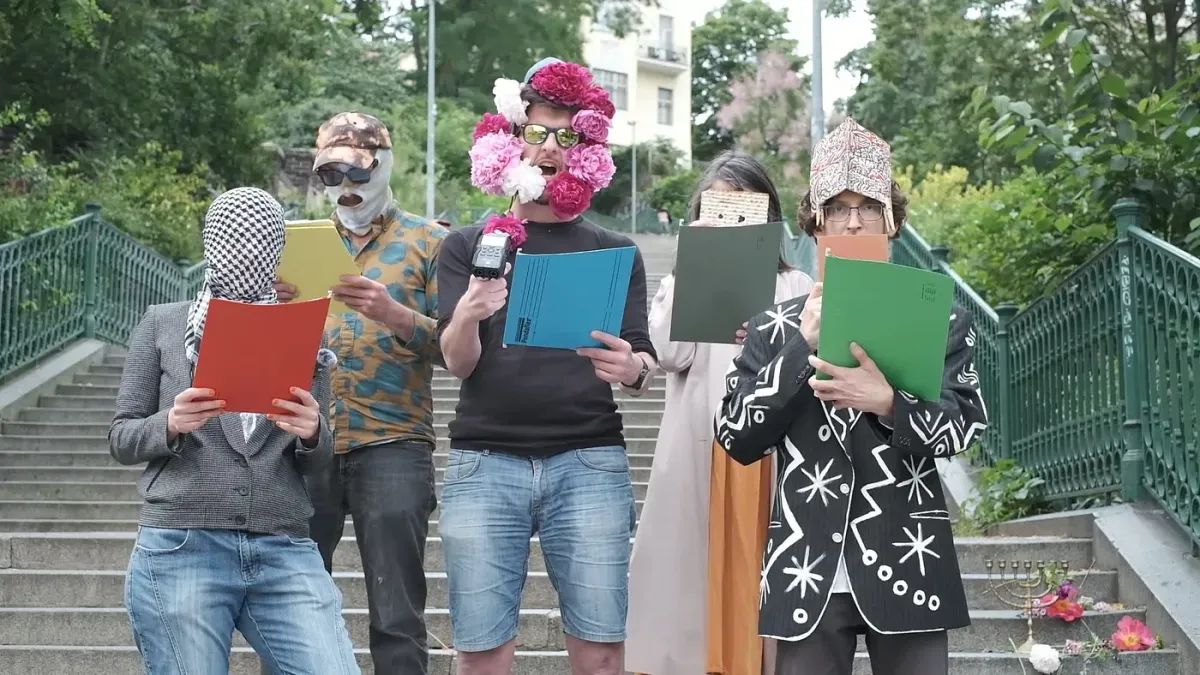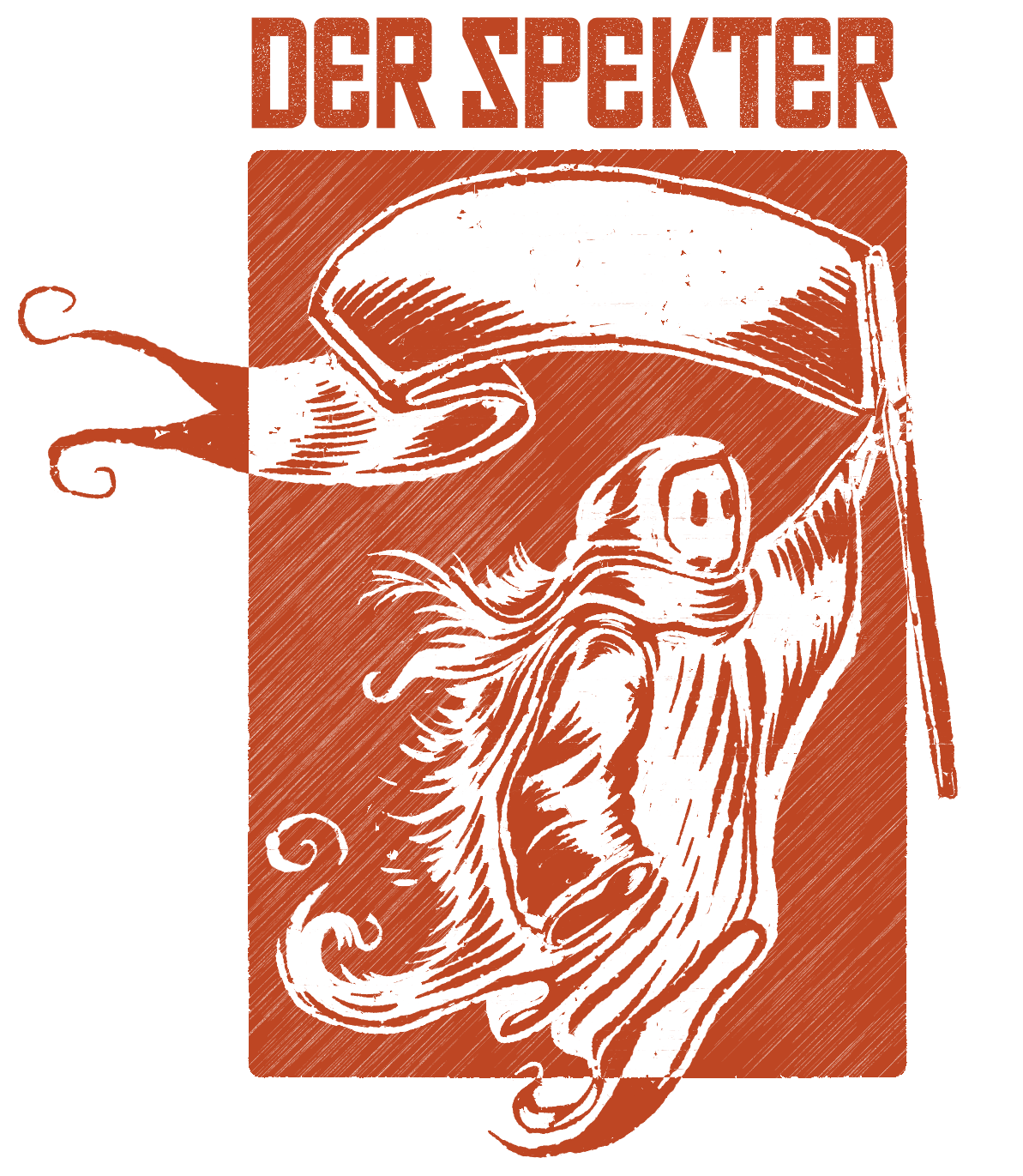Declaration of Independence of Diaspora
Our true birthplace was in Exile. Not when one man plotted out land and called it his, not when another built a palace and some elders declared him king, not when his son built a Temple and made it the center of his Land, but when we were kicked out of Eden — it was then that we were born.

Introduction
On May 1, 2024, Diaspora declared independence. To be precise, the declaration was made by an anonymous Underground Diasporic Committee for the Dispersion of Abomination. To be still more precise, it was a Prague-based group called Jewish Voice of Solidarity (Židovský hlas solidarity) that convened this committee and charged it with writing a declaration of independence. The committee recorded a video of its masked members reading the declaration. The video has been shown to the public twice so far, first in Krakow on May 1, where we were invited to join a Jewish Bloc in the city’s May Day march, organized by activists from the local Café Bund. It was shown for a second time at an event in Prague on June 26. The video has subsequently been posted online by Dabartis, a Vilnius-based “circulator of autonomous forms” whose name is a Lithuanian analogue to the Yiddish idea of “doikayt.”
The Underground Diasporic Committee for the Dispersion of Abomination makes no claim [to] represent everyone living in diaspora. Like any declaration of independence, this one begins as fiction. The committee has imagined what a truly independent state of Diaspora might look like: the symbols and governing structures of a people dispersed among many lands, defending its autonomy from all nation-states.
This is a poetic-artistic fiction, but it’s one that responds to a real demand. For too long, states have been laying exclusive claim to nations. This is catastrophic for the nations rejected by those states — for example, for Palestinians who have suffered from the claims of Israel. But it’s also been disastrous for the nations to which those states lay claim — like Jews around the world (including those in the territory claimed by Israel), who have found it increasingly difficult to speak for ourselves, act for ourselves, find our own paths of solidarity. Solidarity that should be expressed among ourselves and, still more importantly, with others. Because everyone lives, to [a] greater or lesser extent, in diaspora. But every imagining of the universal has to begin somewhere. So we, in releasing this Declaration of Independence, have begun where we are.
The need for an independent path is now felt widely. The reemergence of the Bund is one of its many manifestations. The new Bund, along with other initiatives, have begun to turn the fiction of an independent Diaspora into an institutional reality, creating social organizations through which people can lay claim to their people’s history, reinterpreting it, without subordinating ourselves to the nationality politics of the state of Israel.
What our “Declaration” did was state explicitly the principle that underlies this practical work. We have tried to make manifest what was half-assumed and half-imagined. We have laid it out for others to consider, to accept or reject or change. Like any declaration of independence. It’s up to you to decide how to make it true.
Are we serious? Does Diaspora really need a Declaration of Independence and a name with a capital D? Perhaps we’ve exaggerated a few points, a little. But we’re dead serious. Sometimes the most serious things can only be faced with laughter.
Joe Grim Feinberg, Prague, July 25, 2024
Declaration of Independence of Diaspora
Our true birthplace was in Exile. Not when one man plotted out land and called it his, not when another built a palace and some elders declared him king, not when his son built a Temple and made it the center of his Land, but when we were kicked out of Eden — it was then that we were born.
It was while wandering the desert, not when carving it up with fences, that we learned to let its flowers bloom.
It was not statehood that made us, but slavery in Egypt, captivity in Babylon, and scattering like seeds across the coasts of imperial Rome.
We have seen our mothers’ mothers kidnapped to Assyria and Persia and banished back again. We have seen uncles and nephews in the libraries of Alexandria, the gardens of Granada, in the schools of Vilnius and the market stalls of Salonika, until they had to leave there too.
We have also seen friends trudging past the Himalayas, Balkans, and Carpathians to play for the Nations’ cabarets and courts, to fix the Nations’ pots and sharpen their knives. We have seen sisters and brothers driven from Africa, to work so that the Nations could have rights and states. We have seen others lost in the forests of borderlands and thrown by the waves of every sea, floating on the backs of capsized rafts, turned back from every Nation’s shore.
We have seen our cousins chased at gunpoint from their homes and fields, sent from their ancestral lands in the name of ending exile. In the name of making us a Nation like the others. We have had enough of that kind of Nation.
We do not want to learn from them the arts of home design. We have learned the art of homesickness, so that we can see the homesickness of others. We have learned to roam, sojourn, stray, dawdle, loiter, and meander, also kick about, straggle, gallivant, trespass, traipse, flâner, drift, and sometimes stroll. But when the Rulers and Oppressors weren’t looking, we also learned the art of struggle. We have seen suffering, but we have also climbed to the mountaintops and seen that the world is large. It was when we stood there, knowing that we have not yet found the world’s center and may never reach its ends — it was then that our nation came of age and realized it needs no fatherland or motherland or promised land.
In the name, therefore, of Jews, half-Jews, crypto-Jews, impostor Jews, Jew-curious and barely Jew-ish Jews, as well as Gentiles, and everyone beyond or in between, let us HEREBY DECLARE THE INDEPENDENCE OF DIASPORA from all states, including, but not limited to, the State of Israel.
We make special appeal to the Israeli inhabitants of Diaspora to participate in its upbuilding on the basis of full and equal representation in all its provisional and permanent institutions.
THE RIGHT OF RETURN to Diaspora will be open to all
· persons born of Jewish mothers, with proof of their mothers’ Jewishness as evidenced by the signatures of at least two rabbis;
· persons with at least one Jewish grandparent, without proof;
· Jewish persons living in the State of Israel who question whether they belong there;
· persons living outside the State of Israel who may like to visit someday, but not right now;
· persons vaguely interested in, fascinated by, or confused by Jewish tradition;
· persons who don’t care in the least about Jewish tradition;
· non-Jewish migrants and refugees in the State of Israel;
· Palestinians thrown into Diaspora by the State of Israel;
· all people, anywhere, who have no home;
· all other people, everywhere.
DIASPORA makes no guarantees, but it calls on all who live in it, irrespective of religion, race, or sex, to struggle for their rights and the rights of their fellow travelers.
WE EXTEND our hand to all the Nations as they prepare to renounce their states, and to all states if they are willing to forget their Nations.
THE BORDERS of Diaspora are everywhere and nowhere, and can be crossed at any moment.
THE A-NATIONAL ANTHEM of Diaspora is declared to be a medley of “Di Shvue,” “The March of the Unemployed,” “Wayfaring Stranger,” “Follow the Drinking Gourd,” and “Djelem, Djelem,” with several measures open for improvisation.
THE OFFICIAL DIASPORIC LANGUAGES will include Yiddish, Ladino, Judeo-Arabic, Shami Arabic, Shawi Arabic, Circassian, Judeo-Marathi, Amharic, Judeo-Tat, Polish, Czech, Ge’ez, Aramaic, modern Hebrew, Yoruba, Kuki-Chin languages, Armenian, Romani, Ukrainian, Rusyn, Polynesian, German, Russian, Italian, Tamil, Esperanto, Slavic English deprived of articles, dialects, pidgins and patois languages of all kinds, and badly pronounced Hebrew inflected with chapped lips and the slippery cadence of shtetl mud. This list of official languages will be continually adjusted and indefinitely expanded.
DIASPORA HAS NO FLAG, but it may freely decorate the walls of the Nations with stickers and graffiti, especially but not limited to the purpose of covering over fascist slogans. Ships of Diaspora will sail under a flotilla of ANTI-FLAGS.
THE CONSTITUTION of Diaspora will be drawn up when the diasporic people are ready to encode their shared values. Or never. Diaspora is patient and contains multitudes.
THE DIASPORIC ARMY will contain divisions of 1) vagabonds, disciplined by the sunrise and life on the road, 2) workers with strong arms, 3) scholars with sharp pens, and 4) artists trained in tactics of encirclement, ambush, and guerrilla theater.
THE POSITIONS OF PRESIDENT AND PRIME MINISTER will remain vacant until the Revolution comes, enabling all people everywhere to be at home.
PLACING OUR DISTRUST IN CONTRACTS AND COVENANTS, WE SCATTER THIS DECLARATION, UNSIGNED, ACROSS THE LANDS OF DIASPORA.
IT GOES INTO EFFECT IMMEDIATELY FROM THE MOMENT IT IS READ.
The Declaration is available in print from Jewish Voice of Solidarity (write to jgrimfeinberg@gmail.com). It was first posted online on Medium. For more discussion of the Declaration, listen to Jewish Voice for Solidarity's interview on The Jewish Diasporist podcast.




